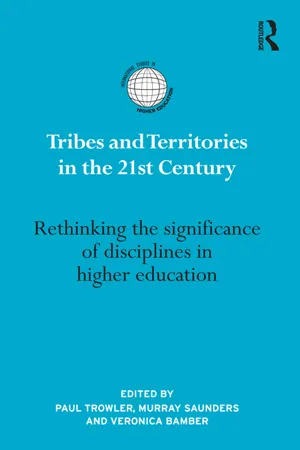
Tribes and Territories in the 21st Century
Rethinking the significance of disciplines in higher education
- 294 pages
- English
- ePUB (mobile friendly)
- Available on iOS & Android
Tribes and Territories in the 21st Century
Rethinking the significance of disciplines in higher education
About This Book
The 'tribes and territories' metaphor for the cultures of academic disciplines and their roots in different knowledge characteristics has been used by those interested in university life and work since the early 1990s. This book draws together research, data and theory to show how higher education has gone through major change since then and how social theory has evolved in parallel. Together these changes mean there is a need to re-theorise academic life in a way which reflects changed contexts in universities in the twenty-first century, and so a need for new metaphors.
Using a social practice approach, the editors and contributors argue that disciplines are alive and well, but that in a turbulent environment where many other forces conditioning academic practices exist, their influence is generally weaker than before. However, the social practice approach adopted in the book highlights how this influence is contextually contingent – how disciplines are deployed in different ways for different purposes and with varying degrees of purchase.
This important book pulls together the latest thinking on the subject and offers a new framework for conceptualising the influences on academic practices in universities. It brings together a distinguished group of scholars from across the world to address questions such as:
-
- Have disciplines been displaced by inter-disciplinarity, having outlived their usefulness?
-
- Have other forces acting on the academy pushed disciplines into the background as factors shaping the practices of academics and students there?
-
- How significant are disciplinary differences in teaching and research practices?
-
- What is their significance in other areas of work in universities?
This timely book addresses a pressing concern in modern education, and will be of great interest to university professionals, managers and policy-makers in the field of higher education.
Frequently asked questions
Information
Table of contents
- Cover Page
- Half Title page
- Series page
- Title Page
- Copyright Page
- Contents
- List of Figures and Tables
- List of Contributors
- Series Editors’ Introduction
- Introduction
- Part 1 Theorising (Inter-)Disciplinarity and Social Practices
- Part 2 Disciplinary Differences and Research Practices
- Part 3 Disciplinary Differences and Learning and Teaching Practices
- Part 4 Catalysts for Changing Disciplinary Practices
- References
- Index